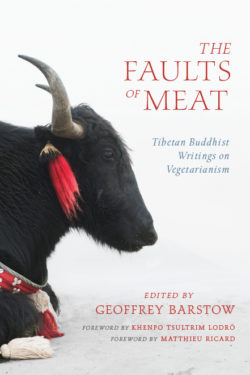Geoffrey Barstow

Geoffrey Barstow is an American scholar of Tibetan Buddhism whose research focuses on animal ethics and particularly the practice of vegetarianism. He asks questions about how animals were viewed, how they were treated (ie: eaten), what that can tell us about Tibetan Buddhism, and how Buddhist ideas about animal ethics might impact broader philosophical discussions. As an undergrad, Barstow studied Buddhism at Hampshire College and the Rangjung Yeshe Institute. He then received his PhD from University of Virginia in 2013 and is now an associate professor of religious studies at Oregon State University. He is a student of Chökyi Nyima Rinpoche.
Books, Courses & Podcasts
The Faults of Meat
Should all Buddhists be vegetarian?
Vegetarianism is an important topic of debate in Buddhist circles—some argue that Buddhists should avoid meat entirely while others suggest that it is acceptable. For the most part, however, this ethical query has been conducted in the West without consulting traditional literature on the subject. The Faults of Meat brings together for the first time a collection of rich and intricate explorations of authoritative Tibetan views on eating meat. These fourteen nuanced texts, ranging from scholastic treatises to poetic verse, reveal vegetarianism as a significant, ongoing issue of debate for Tibetans across time and traditions, with a wide variety of voices marshaled against meat, and a few in favor. Authors include many important Tibetan teachers:
Dolpopa Sherab Gyaltsen (1292–1361)
Khedrup Jé (1385–1438)
The eighth Karmapa, Mikyö Dorjé (1507–1554)
Shabkar Tsokdrük Rangdröl (1781–1851)
Khenpo Tsultrim Lodrö (1961– )
and many more.
These Buddhist teachers recognize both the ethical problems that surround meat eating and the practical challenges of maintaining a vegetarian diet; their skilled arguments are illuminated further by the translators’ introductions to each work.
The perspectives in The Faults of Meat are strikingly relevant to our discussions of vegetarianism today; they introduce us to new approaches and solutions to a contentious issue for Buddhists.

